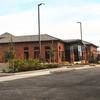The young family of three stands, anxious, in the front yard. Sayed Zia, who has sharp eyes and dark hair cut close, juggles his chatty, curly-haired 2-year-old, Naha Sadat. Asma Elham, in a blue-and-white polka dot hijab, carries boxes and bags. While it hasn’t quite hit them yet, the home they’re standing in front of is theirs.
Zia, Elham and their daughter will soon be residents of Habitat for Humanity’s largest housing project in Colorado, Sheridan Square. Sheridan Square is a 63-home, 4.35-acre development southeast of Knox Court and Kenyon Avenue, built on what was once home to Fort Logan Elementary School. The $15.6 million project provides permanent affordable housing for 355 people — 130 adults and 225 children.
Construction began in September 2016 and the first wave of families moved in last fall. Zia, Elham and Naha are part of the second wave of residents moving into the community of energy-efficient, two- to five-bedroom single-family homes, duplexes and triplexes.
They won’t move in for a few weeks, but the excitement during a Feb. 28 walk-through of their home-to-be is palpable.
Naha, a devotee of the Disney Channel show “Sofia the First” and its titular princess, was promised a Sofia-themed bedroom. She’ll gaze up at Sofia the First art on the walls, play with her Sofia dolls and slumber in a Sofia the First bed. She squeals in delight and jumps up and down on the carpeted floor of her empty room.
“Where should we put your bed?” Zia asks Naha.
She stops spinning for a moment to think, and points to the dead center of the room.
The family’s home is next to what will become a neighborhood park, and the play area will be visible from Naha’s large bedroom windows. Elham and Zia are excited for the extra space, the park, the sense of community and the feeling of permanency Sheridan Square will bring.
Elham is looking forward to planting a garden. She hopes to grow flowers and gandana, an Afghan vegetable similar to a leek that she longs for the taste of.
“It doesn’t grow here,” she said.
Elham and Zia came to the United States in September 2014. Prior, Zia was a translator for the U.S. military. When the soldiers he was working with left Afghanistan, his and Elham’s lives were put at risk. They fled.
Related Articles
-
73 percent of Denver voters would support tax increases to fund affordable housing efforts, survey says
-
Breckenridge weighs DNA testing dog poop after complaints pile up
-
Longmont resumes discussion about reinstating affordable housing mandate
-
Housing authority orders Aspen woman to sell apartment for violating rules
-
If Amazon cares about housing, Denver’s unlikely to land HQ2 but we’re close
Here in Colorado they felt safe, but unsettled, living in a series of small apartments in Thornton that seemed even smaller after Naha was born. Zia’s job at a manufacturing company in Englewood meant daily commutes across the traffic-clogged heart of Denver. Elham practiced as a midwife in Afghanistan, but could not do so here. The perpetually malfunctioning laundry room at their last apartment meant regular trips to the Laundromat while caring for little Naha.
Their new two-bedroom home is among a row of duplexes and triplexes and painted a dusty robin’s egg blue. It’s one of many steps forward in their new life in America. As another step, Zia and Elham are taking classes at Community College of Denver. He’s studying computer information sciences, she’s getting certified to practice as a midwife once more. (Naha occasionally attends daycare, and wants to be a princess when she grows up.)
Elham carries a white-and-black floral patterned box into the home. Lovingly wrapped in cloth inside is their family’s Quran. Naha stretches on the tips of her toes to reach the book, planting a few sloppy, little kid kisses on the blue and gold embossed cover. Elham follows, giving thanks for their new home.
“(We’re excited) to have our own place,” Zia said. “We don’t have to worry about moving” again.
The family waited two long months after applying for a Habitat for Humanity home to learn if they were eligible. Then came at least 200 hours of “sweat equity.” In lieu of a full down payment, Habitat for Humanity requires each homeowner to roll up their sleeves and work on construction of their home.
Habitat for Humanity also ensures mortgage payments and estimated utilities and insurance costs don’t rise above 30 percent of a family’s gross monthly income. The organization works hard with the new homeowners to create lives of stability. Two-bedroom homes at Sheridan Square are selling from $168,000, with the larger houses selling for up to $225,000.
Affordable housing is sorely needed in the Denver metro region: The average single-family home in Denver sold for $444,429 in February, according to market trends. A recent study found it takes a salary of $68,436 a year to buy a median-priced home here.
It’s important for Habitat for Humanity to not just help individuals, but whole communities, said Jeanne Fischetti, the organization’s director of sponsorships.
“What sets (this project) apart is the impact it will be able to have on the city of Sheridan,” Fischetti said.
Building a large development in a small community multiplies the impact, she said. Fischetti rattles off the numbers. The influx of homeowners will raise the owner-occupied housing rate in the neighborhood by 6 percentage points to almost 50 percent, which increases neighborhood stability. The hundreds of school-aged children living in Sheridan Square will help fill classrooms and bring money to Sheridan School District No. 2. And the 63 houses will contribute about $77,000 in annual property taxes to the city.
Habitat is working with the University of Colorado Evaluation Center on a 30-year study of the community’s property taxes, homeownership rate and other factors that impact the city.
“Habitat’s program is really transformational,” Fischetti said.
All of Sheridan Square’s homes should be occupied by summer 2019. Sixteen homes are under construction and nine others will follow. (Volunteers are always needed to help with construction, Fischetti noted.)
The new homes make an impact, even before move-in day. As Zia, Elham and Naha wrap up the walk-through, they take a moment to stand in the living room, gazing at rooms that won’t stand empty for much longer.
“Who is home?” Zia asks Naha with a warm smile
“Me!” she exclaims, and collapses in a fit of giggles on the floor of her family’s new home.
Want to learn more about the program or apply for a home of your own? Find your local Habitat for Humanity affiliate and submit your application at habitatcolorado.org.
Updated March 8, 2018: Because of a reporter’s error, a previous version of this story incorrectly stated the cost of the Sheridan Square project. It is $15.6 million.


